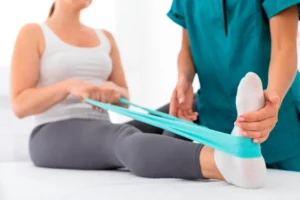COVID-19 is a serious disease, which can cause mild to severe symptoms in affected patients ranging from fever, headaches, sore throat, dry cough to more severe symptoms such as pneumonia and acute respiratory distress syndrome or respiratory failure leading to more serious complications.
For many patients who are recovering, a loss in lung function is one of the common conditions faced. The patient’s recovery depends upon the severity of the disease and the damage that may have occurred to their lungs. That damage to the lungs impairs the ability to breathe and to supply oxygen to the body, which makes recovery and daily activities harder in the short to medium term.
That is where ‘Chest Physiotherapy’ can help.
Chest Physiotherapy comprises of physical techniques and exercises that improves lung function and helps you breathe better. It helps to expand the lungs, strengthens breathing muscles, and loosens and improves drainage of thick lung secretions. The good news is that unlike chronic obstructive pulmonary disease (COPD) and pulmonary fibrosis, the damage from COVID-19 may be largely reversible. One can aid recovery with a program of breathing exercises and mobility exercises that lead gradual strengthening and recovery.
Our Chest Physiotherapy program is aimed at –
- Facilitation of removal of retained airway secretions caused as a result of inflammatory processes caused due to COVID 19.
- Improvement of lung capacity and prevention from Lung collapse.
- Reduction of the effort required for breathing.
- Improvement of gas exchange thus increasing oxygen saturation levels in the body.
- Physiotherapists/ Respiratory therapists often use different types of chest physiotherapy, including:
- Chest percussion and vibration to help loosen lung secretions.
- Controlled coughing techniques to help break up lung secretions so you can cough them up.
- Deep breathing exercises to help expand the lungs and draw more air into all areas of the lungs.
- Incentive spirometry to help improve lung function by inhaling strongly using a special device. You may use it after surgery to re-expand your lungs and prevent pneumonia apart from conditions caused by COVID 19.
- Positioning to help improve lung expansion and drainage of secretions. Some positions can also be taught to improve breathing and Oxygen Saturation levels.
- Postural drainage to help drain lung secretions.
Chest Physiotherapy can prove to be helpful in the following conditions-
- Atelectasis, in which some or all of lung tissues collapse.
- Bronchiectasis, in which the large airways in the lungs are damaged and widened.
- COPD (chronic obstructive pulmonary disease), which includes Emphysema and bronchitis.
- Cystic fibrosis, which is a genetic disorder that causes thick, sticky mucus build-up in the lungs and other organs.
- Chest physiotherapy can help prevent pneumonia and other breathing problems caused due to long-term immobility.
- Lung infections, which include pneumonia, acute bronchitis, and lung abscess.
- Neuromuscular diseases, which include cerebral palsy, muscular dystrophy, multiple sclerosis, and Guillain-Barré syndrome.
- Surgery, which includes lung removal and other surgeries that make it difficult to take deep breaths. Some types of chest physiotherapy can help prevent pneumonia and other breathing problems after surgery.
At VARDĀN, we are conducting virtual Chest PT sessions to help one with breathing exercises, improve energy levels, graduated strength training to make sure that the recovery rate is accelerated and to fight off the long term fatigue that sets in after COVID illness.
Breathing properly is more important than one might think. Depth and frequency of breaths apart from the organs used to take deep breaths (whether you breathe from your chest or from your abdomen) profoundly affect our body and mind. Learning and using proper breathing techniques is one of the most beneficial things that one can implement for both – short-term and long-term physical and emotional health.
By practicing breathing exercises on a regular basis, we can improve heart rate, blood pressure, digestion, sleep, and the stability of the nervous system as well as stimulate a generalized relaxation response that results in less tension and an overall sense of well-being.
Our ‘Chest Physiotherapy’ will help in heightened breathing efficiency and a healthy pair of lungs amongst other short term, mid- term and lifelong benefits.




